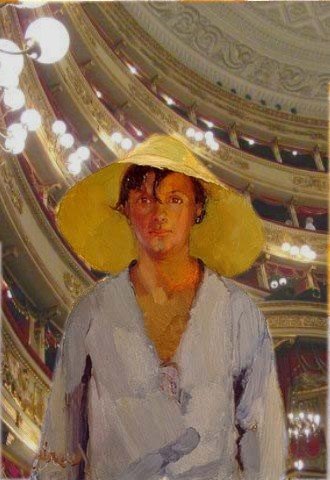
In this obituary of Elena Souliotis, we mentioned her New York debut at the Metropolitan Opera in 1969. Though she was to have sung there during the 1969-70 season, an industrial dispute caused the cancellation of many performances and she never did appear at the house. Her only New York appearances were in concert with the American Opera Society (Anna Bolena, Norma, and Nabucco) and a 1976 Carnegie Hall recital.
The career of the Greek soprano Elena Souliotis (sometimes spelt Suliotis), who has died aged 61, was a meteor that flashed across the operatic firmament only to be extinguished in less than 10 years.
In the 1960s, many commentators - probably unwisely - proclaimed her as the new Callas. The comparisons seemed at first a fair one, as her timbre and personality bore some resemblance to that of her legendary predecessor, but Souliotis squandered her resources in a reckless way, and all too soon her voice seriously deteriorated. She attempted, not very successfully, a second career in the mezzo range, but by the mid-1970s she was virtually at the end of her career.
Souliotis was born in Athens of a Greek mother and Russian father. She contracted meningitis at the age of two, which left her partly deaf. Her parents emigrated to Buenos Aires when she was five years old. She began her studies there, and then went to Milan to work with the distinguished teacher Mercedes Llopart. She made her debut at the San Carlo in Naples in 1964 as Santuzza in Cavalleria Rusticana. Her career developed very quickly.
She caused a sensation in 1966, when she made her debut at La Scala as the fiery Abigaille in Verdi's Nabucco. The same year she drew the same reaction at the Carnegie Hall, New York, as Donizetti's Anna Bolena, a role she later recorded. Hers was a talent to watch.
She first appeared in London, in a concert of Nabucco in 1968 at the Theatre Royal, Drury Lane, with Boris Christoff and Piero Cappuccilli, an occasion I remember with much pleasure for the seeming emergence of a very special talent. She undertook it again at Covent Garden in 1972, at the start of Colin Davis's regime as music director. Much as her performance was appreciated, the production proved ill-fated. By that time she had already made her impressive debut there as Lady Macbeth (1969), as she also did that year at the Metropolitan, New York. She recorded the work with a deal of success, with Dietrich Fischer-Dieskau in the title role.
Before that Met appearance, she had sung no less a role than Norma at a concert performance of Bellini's opera for the American Opera Society as early as 1967. She then took it all over Italy and recorded it for Decca, who had handed her an exclusive contract. As she was still in her mid-20s, Norma was undoubtedly a step too far for her at that stage in her career. However, a solo recital she recorded at about the same time disclosed her appreciable talent as a singing actor.
At the end of 1967, the arts department at the BBC televised a programme called Suliotis Sings, which caused something of a sensation, and not merely for musical reasons. Souliotis appeared in interview to have a magnetic personality, a sparky temperament, and not least an element of sexual frisson. But the conductor Edward Downes declared, during its course, that she was immature and ought to be careful in what she sang. Certainly some of her singing in that programme and at Covent Garden exposed the dangers of her all-in vocal production, which caused the premature end to her career. Her final appearances at Covent Garden in 1973, as Santuzza, presaged the end.
Souliotis's voice was a true spinto, capable of vocal expressivity combined with power and a deal of flexibility. Its owner used it with unstinting, fearless attack that was at once thrilling and a bit disconcerting for the listener. She obviously reacted willingly to the adoration of her following, and could easily excite every sense. Pressure at the top and bottom of her register was probably the main cause of her early disappearance from a scene she briefly brought to such extraordinary life.
She had a friendly extrovert personality and kept a menagerie of animals. Married, but divorced, she is survived by her daughter Barbara.
· Elena Souliotis, soprano, born May 28 1943; died December 4 2004
(Alan Blyth
The Guardian,
Friday December 10 2004)
"Ben io t'invenni", Verdi's Nabucco
(Vienna Philharmonic Orchestra, 1965)
"Suicidio",Ponchielli's La Gioconda
(Rome Philharmonic Orchestra, Silvio Varviso 1966)


4 comments:
oste andi gia sholia metras hiouhaismata? hahaahaha, kali arhi!!!
thanks my friend
Teleio auto me ta boos!!!! KALORIZIKO! ! ! !
Epishs h DIMITROULA gia egkainio post k h the Voice of the Week-Elena Soulioti htan oti prepei gia egkainio!
σ'ευχαριστώ καταρχάς.
ναι προτίμησα ένα ελληνικό εγκαινίασμα γιατί ρε παιδί μου αυτός ο τόπος έχει βγάλει και βγάζει ακόμα φωνάρες.
και είναι και πολλοί που ούτε που τους ξέρουμε καλά-καλά.
Post a Comment